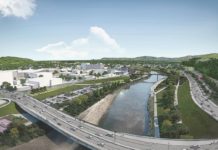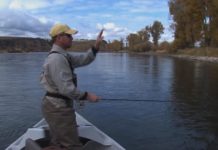* NFA director fears for ‘critical dive and trap area’
* Tells Gov’t to ‘pause’ and not feel COVID pressure
* Activists say petition closing on 17,000 signatures
By NEIL HARTNELL
Tribune Business Editor
nhartnell@tribunemedia.net
A prominent fisherman yesterday voiced his opposition to oil exploration near “some of the most critical dive and trap areas on the Bahama Bank”, adding: “The risks far outweigh the rewards.”
Paul Mailis, director of the National Fisheries Association of The Bahamas, told Tribune Business that even a small oil spill from the well that Bahamas Petroleum Company (BPC) is aiming to spud before Christmas 2020 could threaten the investment made by fishermen in “tens of thousands” of lobster condos and traps laid in the area.
While acknowledging that “opinion varies” among fishermen depending on where they live, as BPC’s plans were “out of sight, out of mind” for some, Mr Mailis urged the Government to impose a “pause” on all BPC’s activities and not feel pressured to go head because of the economic and fiscal devastation caused by COVID-19.
“We’ve discussed these concerns about oil drilling,” he said of the fisheries sector, “because it’s taking place in some of the most critical and important dive and trap areas on the Bahama Bank.
“We feel it’s something we’re not prepared for. Fishermen now have very real and tangible investments out there, the lobster traps and condos. There’s tens of thousands of them there. There’s a lot of fishermen invested there, and the threat to the reef and lobster out there is tremendous even from a small spill. We’re looking at this with great concern.”
BPC and its chief executive, Simon Potter, have repeatedly pointed out that their plans for a first exploratory well in Bahamian waters, named Perseverance One, comply with all Bahamian and international regulatory standards and best practices.
Romauld Ferreira, minister of the environment and housing, confirmed last week that the Environmental Authorisation and all such necessary approvals have been granted to BPC, leaving it clear to proceed, with the Minnis administration repeatedly insisting it is merely honouring an obligation made by its predecessors.
And BPC has also argued that the well will not be seeking to extract commercial quantities of oil but merely confirm the presence of hydrocarbons beneath the sea bed, thereby minimising the possibility of any spill or pollution.
However, Mr Mailis questioned whether either of the Government and BPC “have a plan” to address such an incident. “If several thousand traps are covered in oil, who’s going to pay for that and cover the environmental damage from that?” he asked.
“That’s going to impact fishermen for decades if it does happen. What’s the plan? I’ve not seen anything from the Government. Does the company have a plan? The fishermen feel this has to be done very cautiously.
“I personally am against the oil drilling because the profits will only go to a small amount of people. The majority will not profit. How much is the Public Treasury going to benefit? The risks far outweigh the rewards. We have a thriving fisheries industry in this country and need to protect it.”
Warning that one oil spill could cost The Bahamas its reputation as a tourism destination, Mr Mailis argued that the information made available to the Bahamian public on BPC’s project is lacking – even though both the Environmental Impact Assessment (EIA) and Environmental Management Plan (EMP) for the project have been placed on the Department of Environmental Planning and Protection’s website.
“We need to put a pause on this, and not force it through because of desperate COVID-19 times and because the Government needs money,” Mr Mailis added. “This is a far more impactful situation than we’re prepared to deal with in these depressed times. We need to be careful, very careful.”
He was backed by Prescott Smith, the Andros-based president of The Bahamas Fly Fishing Industry Association (BFFIA), who argued that “oil drilling serves us no benefit” while endangering the environment and failing to empower Bahamians.
BPC’s Mr Potter, in an interview with Tribune Business published yesterday, urged environmental activists to give “a fair representation of the facts” surrounding the company’s project. While saying he welcomed a “robust conversation” on the issues, he accused some of seeking to “misconstrue or misrepresent” facts about it and oil exploration as a whole.
Mr Potter said any debate also needed to take into account The Bahamas’ present COVID-19 economic situation, and the “economic possibilities this could open up” if commercial quantities of extractable oil were found in BPC’s licence zones.
He confirmed, though, that any oil recovered would be sold for processing outside The Bahamas, with the main benefits being royalties earnings for The Bahamas’ sovereign wealth fund as well as the jobs, education and training that BPC has committed to provide under its licence.
However, Casuarina McKinney-Lambert, the Bahamas Reef Environment Educational Foundation (BREEF) executive director, who is spearheading the Our Islands, Our Future campaign against BPC’s ambitions with Waterkeepers Bahamas, also echoed Mr Mailis’ concerns about the proximity of the drilling site to the Great Bahama Bank’s “important fishing grounds” and the Cay Sal Marine Protected Area (MPA).
“Of course the drill site is right next to the Great Bahama Bank, one of our most important fishing grounds, and the leases overlap with existing marine protected areas that are essential for our fishing industry,” she said, adding that the Our Islands, Our Future petition “has now exceeded the target of 15,000 signatures. We’re up to 17,000 now and rapidly increasing”.
Credit: Source link































